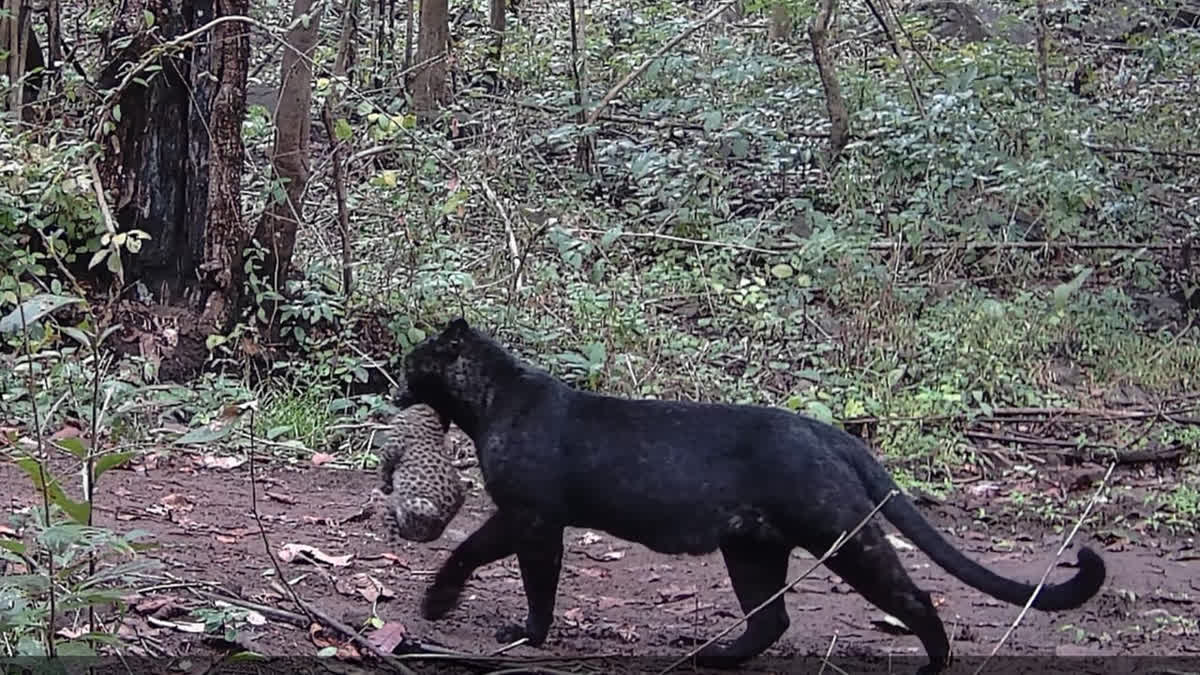Bhubaneswar: At a time when some of the core forest areas are disturbed with wild animals straying into human settlements, the sighting of a black panther carrying its cub, spotted in the central forest region of Odisha, has enthused conservationists and revived hope in habitat management of wildlife in the state.
Chief Conservator of Forests (Wildlife), Prem Kumar Jha, confirmed the sighting, saying, “The black panther was caught on a camera trap, and we are taking all necessary steps to protect its habitat. Black panthers, though often overlooked, play a vital role in maintaining the ecosystem’s balance.”
He had shared the video and still photographs of the panther on January 3 on X, expressing happiness at the region's biodiversity. "These elusive "black panthers" are vital to the ecosystem-protecting their habitat ensures a thriving wildlife heritage," he had stated.
A rare melanistic leopard with cub has been sighted in central Odisha, reflecting the region's incredible biodiversity. These elusive " black panthers" are vital to the ecosystem-protecting their habitat ensures a thriving wildlife heritage. @ForestDeptt @CMO_Odisha pic.twitter.com/IlwaI0qipq
— Prem Kumar Jha (@Prem_CWLWOdisha) January 3, 2025
Corroborating the sighting in Nayagarh, the Divisional Forest Officer (DFO) Khyama Sarangi said, the leopard has reportedly given birth to three or four cubs. “The sight of her carrying one of the cubs has brought happiness to everyone. This is an auspicious sign for Nayagarh,” Sarangi said.
The Nayagarh forests are estimated to host around 70 to 80 tigers, with 60 to 70 being documented on camera. Forest officials believe the population is steadily increasing, signaling a positive trend for the region.
Efforts are underway to protect the black tigers and their cubs from poachers. The DFO assured that the tigress and her cubs are healthy, adding that cubs born to a black tiger and a yellow-striped tiger might later exhibit either black or yellow coloration.
The forest department also reported significant improvements in the forest ecosystem over the past five years, with rising populations of wild animals such as buffalo, deer, wild boars, and peacocks in the Nayagarh forests and the Satkosia sanctuary.
Aditya Panda, a noted wildlife expert, explained that black panthers are a melanistic variant of the common spotted tiger. “In regions where melanistic tigers exist, black panthers are often found. Odisha has reported sightings in areas like Balangir, Sundargarh, Mahanadi, and Satkosia. However, poaching and habitat degradation remain major concerns,” he said. Panda added that these predators primarily feed on deer, wild fowl, and occasionally livestock, underlining their ecological importance.
Conservation Challenges
While the state’s tiger population has shown a steady increase—reaching 696 as per the 2024 census—conservationists are raising alarms about threats like habitat destruction and poaching. Odisha’s first black panther was photographed in 2018, but instances of poaching have cast a shadow over conservation efforts. In recent years, several tiger skins have been seized, primarily destined for illegal trade via Kolkata.
Wildlife experts stress the need for strengthened anti-poaching measures and public awareness campaigns. “Despite some successes, human encroachment and lack of proper notification for elephant and tiger corridors have fragmented habitats, increasing vulnerability,” Panda emphasized.
Black Tiger Safari: A Global First
In a bid to showcase Odisha’s unique wildlife, the state government plans to develop the world’s first Black Tiger Safari near Similipal Sanctuary in Mayurbhanj district. Spread across 100 acres near Baripada, the proposed safari aims to create a safe haven for these rare creatures while boosting ecotourism.
Odisha has the capacity to sustain a tiger population of 700–800 if its forests are preserved and managed effectively, experts say. The Similipal region, known for its tiger population, still holds untapped potential for increasing numbers through habitat restoration and stricter protection.
Tiger Census: Key Insights
The 2024 census, conducted across 47 forest divisions, showcased positive trends. Mayurbhanj and Keonjhar alone reported over 200 tigers, while Satkosia, Mahanadi, and Angul collectively accounted for around 150. Debrigarh, Redhakhol, and Sambalpur forests reported 50-plus tigers each, while smaller populations were recorded in Dhenkanal and Sunabeda regions.
The sighting of the black panther and its cub serves as a timely reminder of Odisha’s biodiversity and the challenges of sustaining it. While plans like the Black Tiger Safari signal progress, experts agree that immediate action on poaching, habitat restoration, and human-wildlife conflict mitigation is crucial to ensure the survival of these majestic creatures.
Read More



